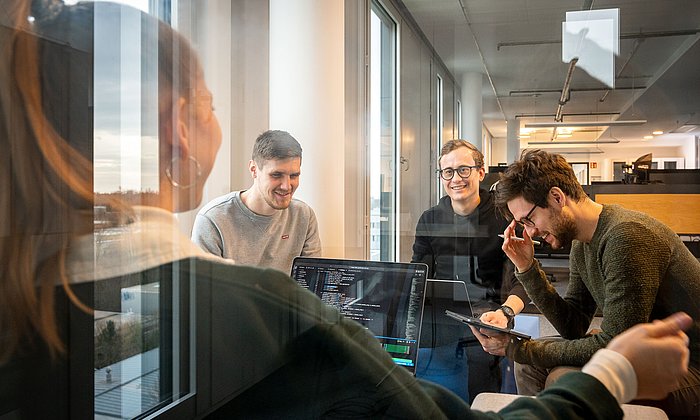Educational programs for AI experts
TUM and LMU open Konrad Zuse School

Aspects such as security and the preservation of the private sphere are key prerequisites for the use of AI. A common reason for a lack of acceptance of AI-based technologies in society and industry is the concern about reliability.
The Zuse School relAI, opened yesterday by Bavarian science minister Markus Blume, will place greater emphasis on this perspective. Along with technical expertise, the school’s educational activities will provide future AI experts with a heightened understanding of the societal importance of reliable AI.
“In addition to educating AI experts, relAI will raise Germany’s international profile in this field and enhance the status of Munich in particular as an AI location. We want to make Munich attractive for international talent in order to recruit experts for the growing AI industry,” says Stephan Günnemann, a founding director of the Konrad Zuse School relAI, Executive Director of the Munich Data Science Institute and a Professor of Data Analytics and Machine Learning at TUM.
Focus on education and research
The Zuse School relAI offers masters and Ph.D. students at TUM and LMU an individual educational and research program to complement existing teaching activities.
“Our students and doctoral candidates will benefit from the expertise of the two excellence universities. Through a number of modules, they will be trained in the end-to-end development of reliable AI systems. At present we have eight master’s students and 20 doctoral candidates. Every year we can offer 15 places in master’s programs and 10 doctoral positions,” says Gitta Kutyniok, a founding director of the Konrad Zuse School relAI and holder of the Chair for Mathematical Foundations of Artificial Intelligence at LMU.
The key research areas at the Zuse School relAI will combine mathematical and algorithmic fundamentals with the application fields of medicine and healthcare, robotics and interacting systems as well as algorithmic decision making. Each of these four areas covers key issues of reliable AI: safety, security, privacy and responsibility.
“The new Konrad Zuse School of Excellence in Reliable AI is the next cornerstone for Bavaria’s ongoing success as Europe’s AI powerhouse: as a globally networked hub linking international, leading-edge research and innovative teaching, relAI pools the excellence of the two best universities in Germany to make AI even more reliable and trustworthy. We need to develop more secure and resilient AI systems that operate in accordance with our values. We in the State of Bavaria are leading the way: thanks to our 5.5 billion euro Hightech Agenda, Bavaria is one of the top three AI regions in the world. By educating responsible visionaries, the Zuse School relAI will ensure the sustainable strength of this unique ecosystem. I wish you every success!”, says science minister Markus Blume.

Funding and structural embedding of relAI
The Zuse School relAI is part of the federal AI strategy and is positioned within the Konrad Zuse Schools of Excellence in Artificial Intelligence program. There are two other Zuse Schools in addition to relAI: first, the Konrad Zuse School of Excellence in Learning and Intelligent Systems (ELIZA), coordinated by TU Darmstadt, in which TUM is also participating. And second, the Zuse School of Excellence in Embedded Composite Artificial Intelligence (SECAI), a joint project of TU Dresden and Leipzig University. The three graduate schools will receive funding from the Deutscher Akademischen Austauschdient (DAAD).
Structurally, the business office of the Zuse School relAI is incorporated into the Munich Data Science Institute (MDSI), an integrated research institute of TUM. The MDSI conducts research on mathematical, statistical and computer science aspects of data analysis and develops new theories and methods of machine learning. The results are used to develop applications in the various research fields at TUM.
Images for editorial use: https://mediatum.ub.tum.de/1717231
Technical University of Munich
Corporate Communications Center
- Julia Rinner
- julia.rinner@tum.de
- presse@tum.de
- Teamwebsite
Contacts to this article:
Prof. Stephan Günnemann
Professur of Data Anlaytics and Machine Learning
s.guennemann@tum.de
https://www.cs.cit.tum.de/daml/startseite/




